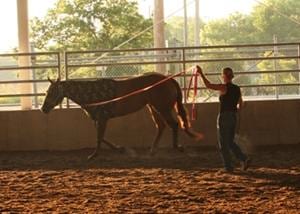AQHA equipment policies go into effect November 1.
By Becky Newell
The American Quarter Horse Journal
October 22, 2012
As we approach November 1 and the beginning of the 2012 AQHA World Championship Show on November 2, the AQHA Animal Welfare Commission wants to remind all exhibitors, owners and trainers about the new AQHA equipment policies that were announced in September.
In August, the AQHA Executive Committee approved the Animal Welfare Commission’s definition of abuse: Any excessive and/or repetitive action to cause obvious distress or discomfort to a horse. The Executive Committee, based on recommendations from the AQHA Animal Welfare Commission, also announced some new equipment policies that will be enforced at all AQHA shows. The policies also included a structure of fines and penalties that will be assessed to violators. The policies are published on AQHA’s website.
At the AQHA Novice Championships in October, as well as at the All American Quarter Horse Congress, AQHA stewards and AQHA Professional Horsemen have been answering questions and educating exhibitors, trainers and owners about the new equipment policies.
“The feedback (on the new policies) from exhibitors and trainers, as well as the industry in general, has been extremely helpful,” said Ward Stutz, AQHA senior director of animal welfare and breed integrity. “The conversations we’ve had with exhibitors have been very beneficial. Our stewards and professional horsemen have been vigilant at the two big shows in October and have handed out a large number of brochures that illustrate the equipment that is permitted and not permitted, as well as listen to exhibitors and trainers input on the equipment rules.”
Part of those conversations led to a clarification in one of the pieces of non-permitted equipment: In roping, speed events, team penning and ranch sorting, western-type equipment must be used. Use of rawhide or mechanical hackamores, or other types of bridles is the choice of the contestant. However, the diameter of mouthpieces, length of shanks and use of curb straps or chains must comply with AQHA rules. The judge or steward may prohibit the use of any bit or equipment they consider inhumane or would tend to give a horse/rider an unfair advantage.
In addition to what has long been listed in AQHA’s Rulebook, beginning with the 2012 AQHA World Championship Show in November, the following rules regarding training equipment, in addition to that listed in the AQHA rulebook, will not be allowed at any AQHA shows:
* Riding in a curb bit without a properly adjusted curb strap/chain is not allowed.
* Wire or solid-metal curb straps no matter how padded are not allowed.
* Wire cavessons; wire or cable tie-downs; bumper bits; metal bosals, no matter how padded; chambons; headstalls made of metal (even if encased in protective material); twisted rawhide or rope are not allowed.
* Slip bit (gag) is allowed (with legal mouthpieces according to AQHA’s Rule book), with 3/8-inch rope
* Running martingales with curb bits are allowed with rein stops (they are not allowed without rein stops)
* Draw reins are allowed (with snaffle or curb bit) when attached no lower than the elbow of the horse (not allowed when attached between or around the front legs).
* For training equipment, there are no restrictions on the kind of mouthpiece used unless a judge or steward deems the use of it inhumane.
Go to bit.ly/AQHAwelfare for more details on the above-mentioned tack.
“As we continue to modify rules regarding all tack and equipment, we encourage trainers and exhibitors to give us their feedback,” said Stutz. “Our stewards, especially those that steward the larger shows such as the Congress and the World Show, are very knowledgeable and willing to discuss these guidelines. They also are very good about passing input along to members of the Animal Welfare Commission when clarifications or modifications need to be made, so we encourage people to provide us with their feedback.”
“The greatest danger to our industry is the inhumane treatment of our horses during their training and the resulting appearance in the show ring,” said Jim Heird, executive professor and coordinator of the equine sciences initiative at Texas A&M University, and chairman of the AQHA Animal Welfare Commission.
That means training practices that cross the line, misuse of equipment, regardless of how humane one wants to claim it might be, and things like this have to become a thing of our past, said Tom Persechino, AQHA executive director of competition and breed integrity.
“While we may disagree on particular points or pieces of equipment, there is common ground between trainers and where AQHA is headed,” he added. “The vast majority of trainers and exhibitors are good people who have the best interest of the horse in mind.
“Regardless of the number of people who are using equipment improperly or harshly, the use of all equipment needs to be addressed and horsemen and -women need to understand that it only takes one person to create a negative perception of our industry,” he said. “We are living in a very different time where social media, technology and people’s unfamiliarity with the horse industry constantly puts us in a defensive mode. It’s never been a goal to punish but to bring about change and protect our horse and our industry before someone else decides what is right and what isn’t.”
Persechino suggested that if anyone has any of this equipment in their trailer tackroom, “we’re suggesting that you take it out now and don’t even bring it to the show – it is not allowed on the show grounds. Again, this is about protecting the horse.”
And the fines and penalties have been established to deter people who might even think about abusing a horse or using illicit drugs, he added.
“The fines and penalties chart further illustrates the consequences of breaking the rules,” Persechino said.
The AQHA Animal Welfare Commission also recommended – and the Executive Committee approved – the formation of an AQHA Grievance Committee that will consider fines and/or penalties to include suspension from competition or even suspension from AQHA as meaningful deterrents. The grievance committee will also investigate other forms of penalties and educate and hold owners to a higher level of accountability.
Go to bit.ly/AQHAwelfare for more details.









